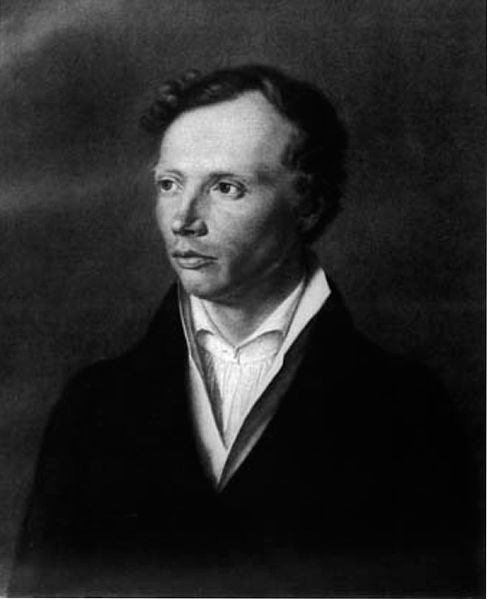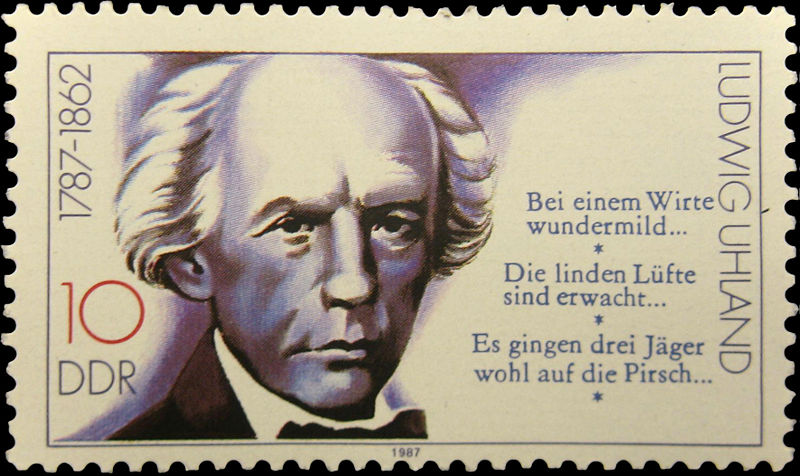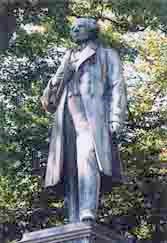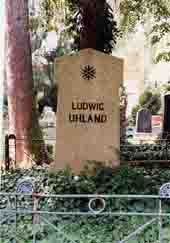|
return to website
 Johan Ludwig Uhland Johan Ludwig Uhland
 From Wikipedia,the free encyclopedia From Wikipedia,the free encyclopedia
 
 Johann Ludwig Uhland Johann Ludwig Uhland
 26 April 1787 ~ 13 November 1862 26 April 1787 ~ 13 November 1862
 was a German poet was a German poet
 
 Ludwig Uhland Stamp ~ 1987 Ludwig Uhland Stamp ~ 1987
He was born in Tubingen, and studied jurisprudence at the university there, but also took an interest in medieval
literature. Having graduated as a doctor of laws in 1810, he went to Paris for a few months; and from 1812 to 1814 he
worked as a lawyer in Stuttgart, in the bureau of the minister of justice.
He had begun his career as a poet in 1807 and 1808 by contributing ballads and lyrics to Seckendorff's Musenalmanach;
and in 1812 and 1813 he wrote poems for Kerner's Poetischer Almanack and Deutscher Dichterwald. In 1815 he collected his
poems in a volume entitled Vaterländische Gedichte, which almost immediately secured a wide circle of readers. To almost
every new edition he added some fresh poems. His two dramatic works Ernst, Herzog von Schwaben (1818) and Ludwig der
Baier (1819) are unimportant in comparison with his Gedichte.
As a lyric poet, Uhland must be classed with the writers of the romantic school. Like them, he found in the Middle Ages
the subjects which appealed most strongly to his imagination. Yet his style has a precision, suppleness and grace which
distinguish his most characteristic writings from those of the romantics. Uhland wrote poems in defence of freedom, and in
the states assembly of Wurttemberg he played a distinguished part as one of the most vigorous and consistent of the liberal
members.
In 1829 he was made honorary professor of German literature at the University of Tubingen, but he resigned in 1833,
when the post was found to be incompatible with his political views. In 1848 he became a member of the Frankfurt Parliament
that convened in the course of the 1848 revolution.

The first monument one will see when visiting Tubingen is the statue of Johan Ludwig Uhland on Uhlandstrasse near the Tubigen
Central Railroad Station. He was a linguist, poet, and collector of traditional folk songs and legends. He was born, worked,
taught and died in Tubingen. His thought was liberal and he has been loved and respected in Tubingen.
One of his poems:
THE SHEPHERD'S SONG ON THE LORD'S DAY
The Lord's own day is here!
Alone I kneel on this broad plain:
A matin bell just sounds; again
'Tis silence, far and near.
Here kneel I on the sod:
Oh, deep amazement, strangely felt!
As though unseen, vast numbers knelt
And prayed with me to God.
Yon heaven, afar and near,--
So bright, so glorious seems its cope
As though e'en now its gates would ope:--
The Lord's own day is here!
Translation of WW Skeat

Johann Ludwig Uhland, Poet
1787-1862
Tubingen
Uhland, Texas located just south of Austin (capital of Texas) is named in his honor.
Source - This is a file from the Wikimedia Commons.
Commons is a freely licensed media file repository. This image (or other media file) is in the public domain because its copyright has expired.
This applies to the United States, Australia, the European Union and those countries with a copyright term of life of the author plus 70 years.
Copyright 1963-2019
Updated
10/17/2019
|

